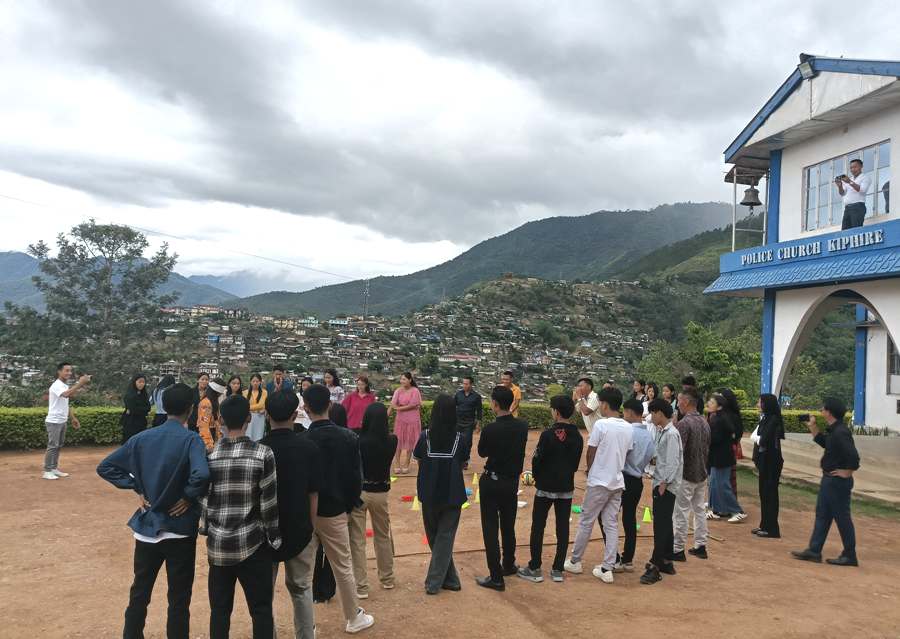Eastern Mirror’s 2-part series explore the reality behind Nagaland's ‘War on Drugs’ and the challenges in combating substance abuse.
Share

Idaizeule Lungalang
DIMAPUR — As illustrated in the first of this two-part series, questions still persist about the on-ground impact of the Nagaland’s ongoing ‘War on Drugs’.
While Director General of Police Rupin Sharma highlighted notable improvements in police efforts, he pointed out that similar commitment is lacking across other government departments and the wider society, raising concerns about the campaign’s overall effectiveness.
In this final part, Eastern Mirror spoke to representatives of the Kripa Foundation and the Nagaland Police Baptist Churches Association (NPBCA)—who underscored the need to shift from punitive responses to a health-centred and compassionate approach while dealing with the issue of drug and substance abuse.
In the fight against addiction and HIV and AIDS, the Kripa Foundation, a non-governmental organisation (NGO), continues to play a pivotal role in offering rehabilitation services and support to individuals affected by chemical dependency and HIV.
Abou Mere, Director of Kripa Foundation, emphasised that criminalising personal substance use and the social stigma surrounding it have created major barriers to accessing health services. These barriers, he warned, have led to serious health complications and, in many cases, premature deaths.
Reflecting on Nagaland’s past, he recalled the ineffective approaches to drug dependency during the late 1980s to mid-1990s, which resulted in “devastating consequences.” He said these lessons must inform the present response.
Mere stressed that the ‘War on Drugs’ must not become a war on the people who use drugs. “It should be centred on health and human rights,” he asserted.
He called for the state to develop a new and comprehensive Nagaland Substance Abuse Prevention and Treatment Policy, one that balances supply control with demand and harm reduction. According to him, this must be a coordinated approach that integrates real-time data and ground realities.
He further urged the chief secretary of Nagaland to revamp and convene the Committee of Concern (CoC)—a forum involving department heads, civil society organisations (CSOs), and NGOs—for meaningful policy engagement and inclusive interventions.
This is essential to ensure that our efforts are grounded in evidence-based strategies, and that they reflect the actual substance use situation in our state, Mere said.
He also called for stronger political leadership and action from ministers and MLAs to reinforce and expand the current activities aimed at supply control, demand reduction, and harm reduction.
The Kripa Foundation has been designated as the State-Level Coordinating Agency (SLCA) for Arunachal Pradesh and Nagaland by the National Institute of Social Defence (NISD), under the Ministry of Social Justice and Empowerment (MSJE), Government of India. The organisation is tasked with capacity-building and technical support for NGOs and stakeholders in the region, Mere said.
While law enforcement plays a key role in cutting off supply chains, Mere noted that demand and harm reduction are equally critical to achieve lasting impact.
He acknowledged that plugging transit points and interdicting traffickers may yield short-term success. However, unless the root causes of substance abuse are addressed, the crisis may persist or simply shift to other drugs.
Mere appreciated that the Nagaland Police have “stepped up” their efforts—increasing drug seizures and arrests—while also ensuring that human rights norms are respected, especially for those seeking treatment.
He emphasised that while addicts should be treated with compassion, there must be no leniency for drug traffickers and peddlers.
Role of the Church
Tsenbemo R. Ngullie, Youth Secretary of the Nagaland Police Baptist Churches Association (NPBCA), spoke about the church’s role in addressing substance abuse, especially among youth.
He expressed deep concern about drug use within the police community, particularly among younger personnel. In response, the NPBCA Youth Department has been engaging youth leaders through various awareness and training initiatives.
The department’s ongoing seminar, ‘Every Life Matters’ (ELM), is one such initiative aimed at educating youth in police churches about the forms of substance abuse and how to cope with them.
Ngullie said addiction’s impact goes far beyond the individual, damaging families, weakening church communities, and disrupting spiritual life. “Addicted individuals often exhibit degraded life values,” he said, which contributes to “chaos and despair at home” and declining youth engagement in churches.
To support those affected, the NPBCAYD encourages a culture of openness and honesty. Individuals are urged to seek help without fear of stigma, stay connected with spiritual leaders, and pursue professional treatment alongside spiritual guidance.
A holistic approach combining spiritual guidance with medical assistance is deemed essential for overcoming addiction, he said, adding that the church emphasises love and compassion towards those battling substance abuse, in alignment with biblical teaching.
To fight the stigma surrounding addiction and prioritise recovery, churches can organise workshops, seminars, and awareness campaigns. While resources for families are limited, he said that separate training sessions for parents and youth are being conducted to bridge that gap.
He also pointed out that churches face challenges, especially as addiction among police personnel is often exacerbated by stressful and high-pressure environments.
Ultimately, he said, the church must provide holistic care—offering both spiritual and practical support.
In a message to those struggling, Ngullie advised them to, “Admit to it and be willing to address it—do not underestimate any kind of addiction. Your life is more valuable than your fear… If you are willing to rectify your ways, there’s nothing impossible for God. He will help you overcome this addiction and you can be a whole new creation and a blessed one.”
(The writer is a student of MA in Journalism and Mass Communication, Nagaland University, Lumami. She is currently an intern at Eastern Mirror).